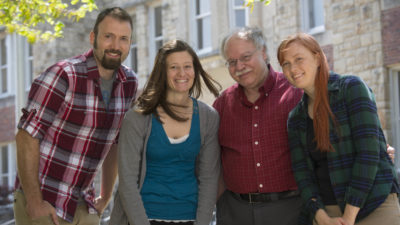UMKC wins multiple awards in mathematics writing contest
When looking for a common thread among Adrien-Marie Legendre, Florence Nightingale and Gabriel Cramer, few of us would correctly call “Mathematics.” But mathematics is the tie that binds these three disparate historical figures together.
The three were topics of choice for some of Dr. Richard Delaware’s students in the History of Mathematics, Writing Intensive course at the University of Missouri-Kansas City.
Delaware’s students know that the papers and essays they write may be submitted for publication in Lucerna, UMKC’s annual peer-reviewed undergraduate research journal; the Sosland Journal of exemplary UMKC student writing in composition or writing intensive courses; or by Delaware to HOMSIGMAA, the History of Mathematics Special Interest Group of the Mathematical Association of America.
Since 2004, HOMSIGMAA has sponsored a national contest for undergraduate History of Mathematics expository papers. And if HOMSIGMAA handed out trophies, UMKC might have to build a trophy case. In the eleven years since the awards began, UMKC has landed eight first places and two seconds.
Delaware is proud of the breadth and quality of the writing by his former students and UMKC’s most recent winners: Jenna Miller, a School of Nursing student who wrote about Nightingale, the nineteenth century’s most famous nurse and social reformer; Paul Ayers, UMKC graduate and software engineer who examined the writings of 18th century Swiss mathematician Cramer in the original French; and Anna Riffe, profiler of 18th century French scholar Legendre.
Riffe has always liked mathematics. The more she learned, the more she enjoyed it. She has been successful in teaching mathematics to younger students, and will serve as a graduate teaching assistant for the Department of Mathematics and Statistics next semester.
Riffe took a First Place in the 2014 HOMSIGMAA awards. Her piece described the unfortunate outcome when a certain mathematician tried to prove Euclid’s Fifth Postulate. Over the past 2,000 years, many bright minds have attempted and failed to prove this premise from Euclid’s other four postulates. Riffe, in her paper, “The Impossible Proof: An Analysis of Adrien-Marie Legendre’s Attempts to Prove Euclid’s Fifth Postulate,” explained why Legendre’s name belongs on that list.
The other First Place winner in 2014 is Jenna Miller. Miller, a nursing major who will graduate in 2015, is attracted to medical-surgical nursing. Mathematics is what she does for fun and relaxation. When looking for possible topics, she was overjoyed to find one that combined two of her interests. Jenna wrote, “Casting Light on the Statistical Life of Florence Nightingale.”
Nightingale helped change hospital care after the Crimean War, where she bemoaned the needless deaths she observed. Fearing that the statistics she gathered on such things as sanitation, food and overcrowding would be ignored for lack of impact, she developed graphics that made her findings more eloquent and captured the attention of the British government and Queen Victoria.
Cramer’s Rule is named for Swiss mathematician Gabriel Cramer and is a time-saver for solving systems of linear equations. The point of Cramer’s Rule is to get the one value you need efficiently. In his paper “Gabriel Cramer: Over 260 years of crushing the unknowns,” Paul Ayers read and translated some of Cramer’s work, applauding Cramer’s wisdom that for the past 260 years has helped other mathematicians “crush the unknowns.” Ayers was named a 2014 second-place co-winner.
All three writers said they benefited from the process Delaware uses to track their progress, which he informally describes as “putting our heads together.”
“A written outline, including your topic and a broad plan for the paper. Choose something you like,” Delaware urges. “Try to use original sources as much as possible, i.e., ‘Learn from the Masters’. Then, closely read each source in the context of its time. This is detective work; follow the clues, stick to the truth.”
With his simple guidelines, his hands-on approach and his availability, Delaware is helping his students find success both in and out of the classroom.

